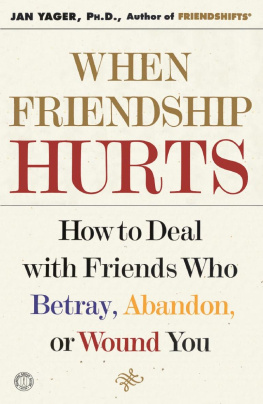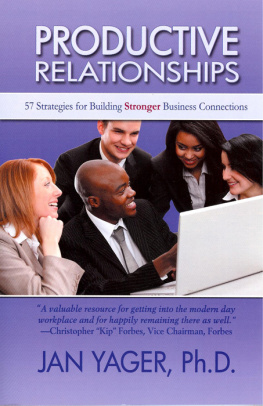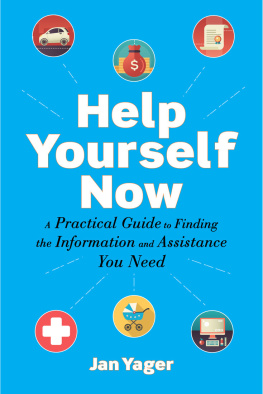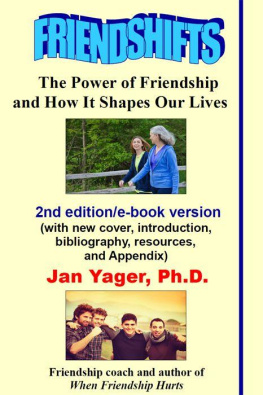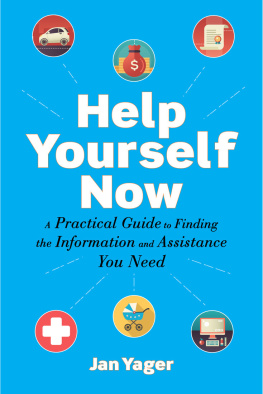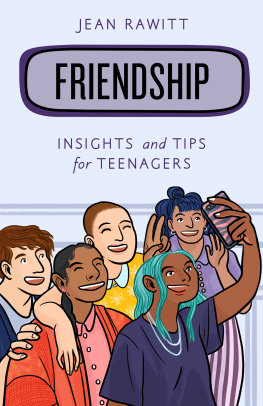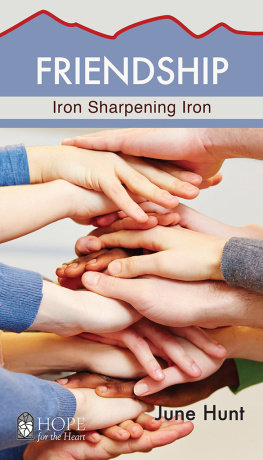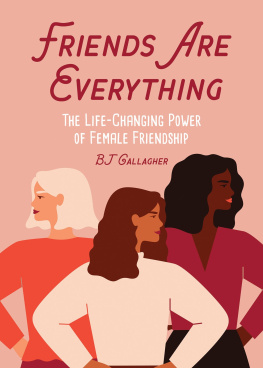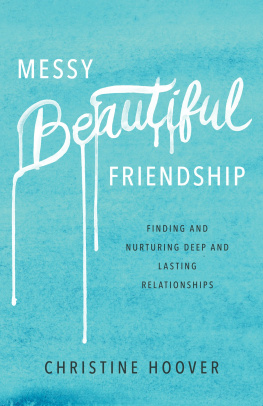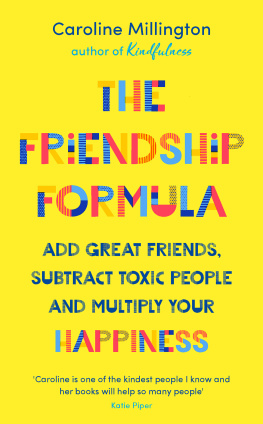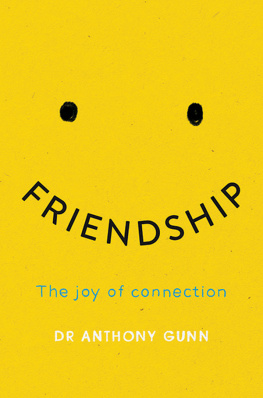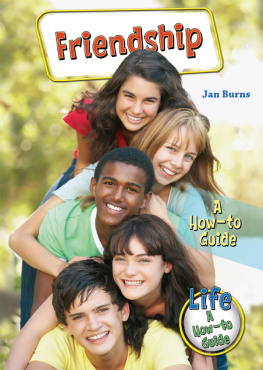Thank you for downloading this Simon & Schuster ebook.
Get a FREE ebook when you join our mailing list. Plus, get updates on new releases, deals, recommended reads, and more from Simon & Schuster. Click below to sign up and see terms and conditions.
CLICK HERE TO SIGN UP
Already a subscriber? Provide your email again so we can register this ebook and send you more of what you like to read. You will continue to receive exclusive offers in your inbox.
Authors Note
Researching and writing When Friendship Hurts provided me with a unique and valuable opportunity: to return to one of my areas of expertise, friendship, but to look at a very specific aspect of itnamely, betrayal in friendship and how to deal with and overcome destructive or negative friendships. My first written treatise on friendship was my sociology dissertation, Friendship Patterns Among Young Urban Single Women (City University of New York, 1983). I followed that with a scholarly, selectively annotated book on friendship and related references, Friendship (Garland, 1985). I continued my friendship research of more than 1,000 people by conducting original surveys and interviews, including a study of 257 randomly selected human resource professionals who were members of an international association. I relied upon all the research I had amassed on friendship to write Friendshifts: The Power of Friendship and How It Shapes Our Lives (Hannacroix Creek Books, 1997; 2nd edition, 1999). That book covered everything from defining a friend to perspectives on friendship in history and in the social sciences; how friendships are formed, maintained, and end; friendship through lifes stages, including childhood, single years, marriage, and the older years, and an application of the friendship principles I had learned to improving marital, sibling, and parent-child relationships. I was interviewed on The Oprah Winfrey Show, The View, The Today Show, The OReilly Factor, on programs on National Public Radio and BBC Radio, and on dozens of other network and cable television and radio shows, as well as by web site, newspaper, and magazine journalists for articles in The Wall Street Journal, Time, Glamour, USA Today, Newsday, Redbook, Readers Digest, Seventeen, and numerous other publications.
Yes, there was lots of interest in friendship, and in my research and my book Friendshifts.
It was exciting to help increase the awareness not only that friendship was an important social relationship, but that researchers had found having even one close friend could extend someones life, as well as increase the likelihood that someone would recover from breast cancer or a heart attack.
But I noticed that some topics were hush-hush, even though the letters I was receiving from readers of Friendships, as well as the e-mail inquiries following a network morning talk show appearance, often posed questions like When is a friendship no longer worth saving? or Would competition be damaging to a relationship of friends? or Why would someone betray her friend? People were asking how to recognize and get out of harmful friendships.
I was also being told about men and women, and boys and girls, who were afraid of friendship and did not have even one friend. Could facing their worst fear, coping with the end of a friendship, help them to get the confidence to initiate one?
When Friendship Hurts benefits from all the friendship research I have been conducting since 1980, but it expands on the prior research with a new study I have conducted over the past five years. That study is based on responses to more than 180 friendship surveys, including responses to a questionnaire posted on my web site ( www.janyager.com ) and selected follow-up in the form of extensive telephone and in-person interviews.
The 180 questionnaires were completed by 41 males and 139 females ranging in age from 13 to 72 (with an average age of 34). In addition to getting responses from practically every state in the United States, I received questionnaires from more than a dozen countries around the world. The respondents were men and women who work for medium-sized to large corporations, as well as entrepreneurs, small business owners, homemakers, publicists, writers, artists, consultants, executives, human resource managers, social scientists, speakers, computer programmers, teachers, secretaries, and military people. Most questionnaires were from individuals who had no connection to anyone else in the sample, although six women who have been part of the same close friendship network that began when they all worked at the same company 20 years ago and six men and women who work for the same consulting firm, with more than 10,000 employees, also completed the survey. Included in the total are 34 male and female adult survivors of childhood sexual abuse from throughout the United States and Canada; of that group of survivors, 28 completed an expanded 104-question survey related to their abuse as well as to their friendship patterns.
These written questionnaires about friendship, betrayal in friendship, and related issues were distributed not with the intention of compiling quantitative data, but as a preliminary method for gathering qualitative data.
Quotes in this book not attributed to a secondary source are from original research I conducted, in the form of in-person or telephone interviews, completed questionnaires, or other written communications; whenever possible, they are reprinted verbatim but, if necessary, they are excerpted. Editing may have been required for either sense or clarification. If words are missing or terms need to be explained, that is indicated by brackets within the quote. If anonymity was requested or required, a fictitious first name has been provided; other identifying details, such as occupation or hometown, may also have been altered to maintain anonymity. However, care has been taken to preserve the integrity of each example.
Secondary sources cited within a chapter also have complete bibliographic entries in the Notes, which are arranged by chapter following the last page of the text.
The purpose of this book is to provide inspiration, information, and opinions on the topics covered. It is sold with the understanding that neither the publisher nor the author is engaged in rendering psychological, medical, sociological, legal, or other professional services.
The number of people I wish to thank for helping to make this book a reality includes those who completed my surveys and allowed me to interview themthose who are anonymous, those who are named, those who shared their stories, and experts who shared their knowledge. I also want to thank my dedicated, kind, thorough, and hard-working editor at Simon & Schuster, Caroline Button, and her conscientious assistant, Nicole Diamond, for their guidance and enthusiasm since I first proposed this book in December 1999.1 also want to thank Trish Todd, vice president and editor-in-chief of the Trade Paperback Group at Simon & Schuster, who shared my previous book on friendship, Friendshifts: The Power of Friendship and How It Shapes Our Lives, with Caroline Sutton, which eventually led to my writing a proposal for a new book on friendship, which was the basis for When Friendship Hurts: How to Deal With Friends Who Betray, Abandon, or Wound You. Thanks also to Simon & Schusters Marie Florio, Christine Lloreda, Laurie Cotumaccio, Marcia Burch, and Loretta Denner, among others.
There have been others who have cheered me on through the demanding research and writing stages of this new booksociologists, psychologists, writers, foreign literary agents, and my dear friendsand I want to name them, asking forgiveness in advance if I have inadvertently left anyone out: Joyce Guy-Patton, Mary Tierney, Sharon Fisher, Suzanne Vaughan, Judy Cohn, Pat Agostino, Nona Aguilar, Illa Howe, Jennifer Ash, Ginny Mugavero, Gail Tuchman, Pramilla Poddar, Elia Schneider, Jose Ramon, Susanne Sinclair, Rhonda Ginsberg, Amy Frishberg, Ruth Winter, Arlynn Greenbaum, Charlotte Libov, Abra Anderson, Mitzi Lyman, Art and Sheila Kriemelman, Lil Schaeffer, Cathy Sebor, Marcia Hoffenberg, Judy Hottenson, Duffy Spencer, Jane Resnick, Janice Papolos, Vicki Secunda, Fran Dorf, Joanne Kabek, Elizabeth Lewin, Phyllis Henkel Silver, Jeanne Muratore, Emily Rock, Linda Blatt, Dottie Berman, Milt Haynes, Laurie Smith, Val Smith, Charlotte Greene, Eddie and Candy Craven, Jon Chakoff, the webmaster of my web site www.janyager, and his wife Lana Chakoff, who put the friendship and betrayal survey on my web site, Nancy Creshkoff, the late Dr. David Leeds, Scott Mendel, Jane Jordan Browne, Evelyn Lee, Ib and Bebbe Lauritzen, Lora Fountain, Michael Meller, Bob Tanner, Elfriede Pexa, Antonia Kerrigan, Kiyoshi Asano, Asli Karasuil, Helene Raude, Lorna Soifer, Shoshi Grajower, Jane Grossinger, Anita Walsh, Sarah Gallick, Julian Padowicz, Jim Cox, Jan Nathan, Terry Nathan, Marilyn Ross, the late Alfred McClung Lee, J. Barry Gurdin, D. Schroder, Norio Irie, Nancy Trent, Nanette Thylan, Brian Bigalow, Rosemary Blieszner, Rebecca G. Adams, the late C. H. Rolph, Judy Kaufmann, Christine Hartline, Gerald R. Baron, Albert Ellis, Kate Cohen-Posey, Betsy Lampe, Bruce Serlin, Laura Lorber, Lillian Vernon, David Hochberg, David and Michelle Riklan, Peggy Stautberg, Andrew M. Greeley, Lucy Hedrick, Fran Pastore, Mark Sanborn, Don Gabor, Jim Donovan, Irwin Zucker, Patricia Gottlieb Shapiro, Nancy Samalin, Diane DiResta, Marsha Snaider, David Carradine, Susie Glennan, Caryl Frawley, Kathy Lindberg, John Dutrow, Marilynn Smith, Bronwyn Poison, Anette Moos, Emma Samuel Etuk, Mae Woods, Lelia Taylor, Leslie Banks, Beth Kalish, Robert and Rande Davis Gedaliah, and Pat Schroeder. I also want to express my appreciation to my sister, Eileen Hoffman, who generously shared her expertise about conflict resolution with me. The section on Handling Conflict with Friends, as well as the sections on friendship and conflict resolution at work, were greatly enhanced by the information she so graciously contributed.
Next page
